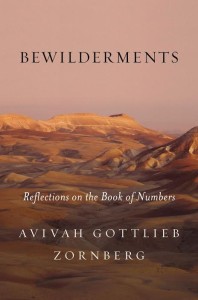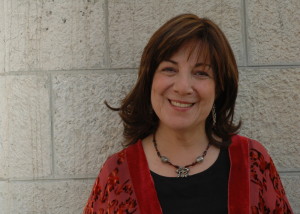Chana Thompson Shor
Avivah Gottlieb Zornberg on Bewilderments
Celebrated everywhere for her brilliant teaching and her dazzling skill in interpreting Bible narratives, Avivah Gottlieb Zornberg offers masterful midrashic readings of biblical texts. Through psychological insight, Jewish philosophy and comparative literary analysis, she plumbs the depths of rabbinic interpretation. Those who’ve had the complex pleasure of reading her previous works — The Beginning of Desire: Reflections on Genesis; The Particulars of Rapture: Reflections on Exodus and The Murmuring Deep: Reflections on the Biblical Unconscious — will be delighted to know that Bewilderments: Reflections on the Book of Numbers is just out from Knopf Doubleday ($28.95). But even new readers will savor this commentary, accompanied by the biblical text.

Zornberg’s analysis of the book of the Bible known in Hebrew as “BaMidbar” (“in the wilderness”) weaves together seemingly opposing themes. One is the tragedy that those in the generation who leave Egypt will never enter the Promised Land; instead they wander, homeless and skeptical, in a wilderness both physical and a spiritual. The second theme arises from Hasidic insight, seeing the wilderness wandering as a period of spiritual yearning, and of a people’s intensive engagement with God. The combination resonates profoundly with the human condition at the same time that it probes the idea of an imperfect people nevertheless chosen by God.
Curious about her approach, Rabbi Chana Thompson Shor spoke to Dr. Zornberg via email.
What most surprised you while you were exploring BaMidbar in preparation for writing Bewilderments?
Interesting question! The surprise lay in the stark temporal structure of the book, with the 40-year gulf of dying somehow camouflaged, short-circuited, so that the generations replace each other without remark. The tragedy of mortality and particularly the tragedy of the failure of the Exodus project, at least for its protagonists, made me think again about the ongoing skepticism of the people’s voice.
Do you think the book of BaMidbar is essentially tragic, because those who leave at the Exodus never “arrive”? Or does Israel’s evolution in the wilderness fundamentally redeem the tragedy?
I veer away from “fundamental redemptions.” I think there is a certain change between the generations, but at the same time, “Plus ca change, plus c’est la meme chose!” I think that redemption happens in listening to oneself. That is the power of the many things said, in anger and despair and resentment, throughout the wilderness. Something accumulates as the generations listen to themselves and then read themselves. It is an ongoing process of refining interpretation. Which does not dispose of the tragic dimension of the narrative.

Among the many things said “in anger and despair and resentment” as you put it, we would have to include the people’s complaints about the lack of water, their desire for meat and their accusation that Moses had brought them out to the wilderness to die (which they might as well have done in Egypt). What is so bad about the sin of the Spies who report back on the Promised Land unfavorably — given that we can sympathize with this fear and uncertainty? The Spies report that the current inhabitants of the Promised Land would be a formidable adversary. Given that what they say is essentially accurate, why does this earn the people such a harsh reaction from God?
I see the “sin” as lack of trust, rather than simply fear. This makes love of God, or of the Land, or even of oneself impossible. A deep destructiveness works within human beings, which is self-destructiveness as much as anything else. Human aggression turned against the good should at least be recognized as such. This, I think, is what Caleb and Joshua are saying. Destructive impulses cannot be totally disposed of but may be integrated to allow love to flourish. This is how the Rabbis read Ve-ahavta…. be-chol levavecha — “With both your hearts, the good inclination and the bad one.”
Is your approach to the text “Orthodox”?
I would hope that it would speak to readers regardless of denomination. It is informed by a sense of the sacredness of the texts, rabbinic as well as biblical, and the sacredness of the human quest for meaning.
You live in Israel now, that Promised Land, though you were raised and educated in the U.K. What led to your decision to make aliyah?
I had always hoped to come to live in Israel. Growing up in Scotland, fairly isolated from communal Jewish life and immersed in Jewish texts and a tragic awareness of Jewish history, I felt it evident that the extraordinary gift of Israel should be taken up with gratitude.
How is your work viewed in Israel? Is it affected by the demographic rise in the ultra-Orthodox?
I have always enjoyed my encounter with students of many kinds here in Israel. The demographic growth of the ultra-Orthodox does not trouble me, nor do I think it limits the size of my audience. Times and fashions in Torah study do change, but there is a vital and growing audience, especially among women, for vigorous and creative Torah study.
Why do you think your work resonates particularly with women?
I hesitate to generalize. I have had many engaged and responsive male students. In terms of numbers, more women do seem to be drawn to my classes. Perhaps I seem less threatening because of my “feminine” manner. Or it could be that my interest in relationality, or in the emotional, embodied experience of the text, speaks to women particularly. However, I am not sure about that. And in writing, these suggestions do not seem so relevant.
Is your work itself feminist?
I have a strong interest in the inner and outer lives of women, in their autonomy and expressiveness. I feel the struggles of women as my own. This surely finds voice in my writing and, even more, in my teaching. I would say that my work is informed by, among other things, a feminist sensibility. I am also happy to add that my husband, Eric, fully shares the responsibility of running our household. This has been invaluable in giving me space for my work.
 Please wait...
Please wait...